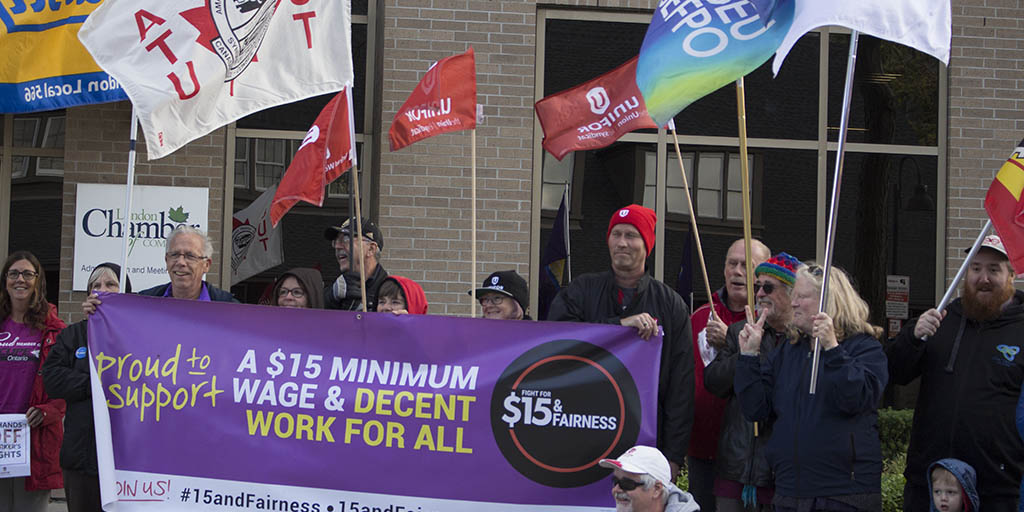Advocates protest review of Fair Workplaces Act
 CREDIT: ANGELA MCINNES
CREDIT: ANGELA MCINNESProtestors stood outside London's Chamber of Commerce on Oct.12 to demonstrate their opposition to the Provincial government's review of the Fair Workplaces, Better Jobs Act (Bill 148).
Workers’ rights advocates gathered across provincial campuses and public spaces on Oct. 12 to protest the Ford government’s vow to review the former Liberal government’s Fair Workplaces, Better Jobs Act, also known as Bill 148.
The day saw representatives from the Ontario Public Service Employee’s Union (OPSEU) unite with organizers of Ontario Federation of Labour’s (OFL) “Fight for $15 & Fairness” campaign to picket and petition against the possibility of repealing the act.
A press release from OPSEU said that the day also commemorated the one year anniversary of the “historic College Faculty strike”.
“148 is an extremely important labour bill,” said Whitney Hoth, Fanshawe English instructor and secretary of OPSEU local 110.
“It has very important labour protections for labour in the province and it also affects the college system, because one of the provisions of 148 is equal pay for work. That means that part-time partial-load teachers should be receiving the same pay per hour as full-time people do,” Hoth said.
Hoth stood at an information table in F building along with John Conley, a second VP of the union and program co-ordinator in the School of Applied Science and Technology.
“We’re doing this information picket to raise awareness of our struggle, and the struggle that our part-time faculty have here. They’re getting paid less than one third fulltime is making and they don’t get benefits and that’s not right,” Conley said.
“We hope we can raise the awareness of students so that when their education is finished and they begin their careers, they will not have to be working side-by-side with the same education experience as other people and not making the same wage.”
Bill 148 was enacted in November 2017. It created worker and union-friendly changes in provincial labour legislation such as allowing parents to take up to 18 months off work, and the expansion of personal emergency leave, as well as increasing the amount of paid vacation for those with five years or more of seniority.
The Bill also increased minimum wage from $11.40 to $14 on Jan. 1 2018. Minimum wage was scheduled to increase once more to $15 the following year.
However, the newly-elected Progressive Conservative government announced in September that it would be halting the wage at $14 as per its campaign promise to do so on behalf of business owners.
“The increase of 20 per cent this year was a lot for businesses to absorb so we’re putting a pause on the minimum wage,” said Labour Minister Laurie Scott.
London Chamber of Commerce CEO, Gerry McCartney, said that the Chamber supported the review of the bill and the minimum wage freeze.
“To be clear we had no issue and never did with the targeted $15 per hour, but what we had difficulty with was the speed with which the [Liberal] government was trying to get there,” McCartney said.
“[The wage increase] was too much too soon. Had they said look, there’s going to be a timetable over the next two, three, four years where we’re going to try to achieve these goals, I think everyone, the business community included, would be more amenable to that.”
OPSEU later joined a protest led by the OFL outside of the Chamber of Commerce.
Also present was Patti Dalton, President of the London and District Labour Council.
Dalton said that the minimum wage increase was long overdue.
“The wages haven’t caught up with the cost of living for decades. As far as I’m concerned, the Chamber of Commerce is shamefully advocating for profit over people,” Dalton said.
“I would ask the Chamber of Commerce, do you care about the workers in this province? Do you care about their standard of living?”
Dalton said that along with minimum wage, Bill 148 is important because of its provision allowing for 10 days of personal emergency leave is helpful to women experiencing domestic violence.
The bill also ensures better working conditions for graduates who are struggling to make a decent living wage.
“We know that students at all levels are living in terrible poverty,” said Dalton. “We must ensure that the wages are higher for them. $15 an hour we realize is not even enough, but it’s a starting point.”
















